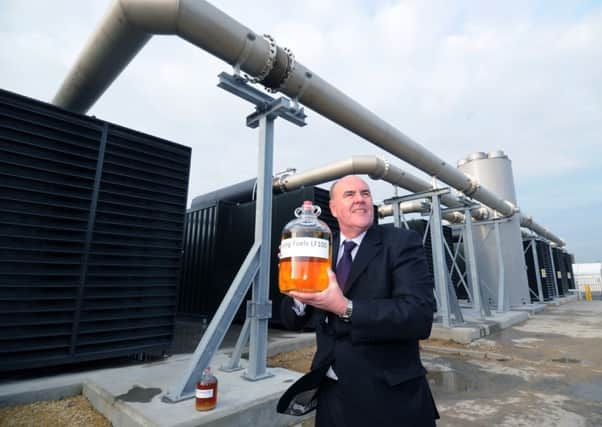Eco-friendly plant turns cooking oil into electricity


REG Bio-Power today formally unveiled the brand new 18 megawatt power plant in Selby, North Yorkshire, which will recover used cooking oil into a hundred per cent, eco-friendly energy which will be called upon by the
National Grid to meet unexpected power demand at short notice.
Advertisement
Hide AdAdvertisement
Hide AdIan Collins, managing director at REG Living Fuels says back up is needed by the plants at key peak periods such as Christmas Day, England matches at last year’s World Cup and a major plotline in Coronation Street will all prompt surges in electricity demand as people watch their TV and switch on their kettles to make a cup of tea.
“It’s called a spike in demand, so when the National Grid needs back up we can help,” Mr Collins said.
He said the Selby power plant would also provide back up if there were problems at other plants.
REG Bio-Power, works in partnership with local councils and waste contractors, on the scheme which turns used cooking oil into an environmentally-friendly bioliquid used to generate clean electricity.
Advertisement
Hide AdAdvertisement
Hide AdMr Collins says pipes and drains can suffer millions of pounds of damage if oil is tipped down them so recycling a waste product makes sense on a number of levels.
“Recovering waste cooking oil to create electricity is incredibly good for the environment. Not only are our sites producing much-needed renewable energy but anyone who recycles their waste cooking oil is also helping cut the UK taxpayers’ £15m bill for repairing drains clogged with fat caused when oil is tipped down the sink.”
People can also do their bit to help by taking their cooking oil waste to a number of locations across the UK which can then be used by the company. People can visit www.livingfuels.co.uk for details of where they can recycle cooking oil.
The official opening of the plant, attended by Selby MP Nigel Adams, came on the day another of the UK’s Big Six energy suppliers has announced a cut in its gas prices in a move benefiting about 1.3 million customers.
Advertisement
Hide AdAdvertisement
Hide AdNpower, which is part of German utility company RWE, said its average tariff will come down by 5.1 per cent from February 16, making it the largest percentage price cut in the recent wave of announcements from the sector.
British Gas is cutting prices by 5 per cent from February 27, Scottish Power by 4.8 per cent from February 20 and E.ON has taken 3.5 per cent from bills with immediate effect.
The npower reduction means that on average the company’s annual standard domestic gas tariff is now £667 per year, down from £702. The industry-wide reduction in bills reflects the falling cost of energy on wholesale markets, although companies have come under fire for being too slow in passing on the savings.
Recent figures from industry regulator Ofgem show that wholesale gas prices are down 19 per cent on last winter.
Advertisement
Hide AdAdvertisement
Hide AdSSE and EDF are the remaining two companies out of the Big Six still to announce price cuts.
Energy Secretary Ed Davey said: “Competition is driving down prices and it’s consumers that will benefit.
“There’s now even more pressure on the remaining energy companies to follow suit and cut their prices.”
Ofgem chief executive Dermot Nolan said the price cuts were a step in the right direction but added that many customers could be better off by up to £250 by moving from a variable rate to a fixed-rate deal.